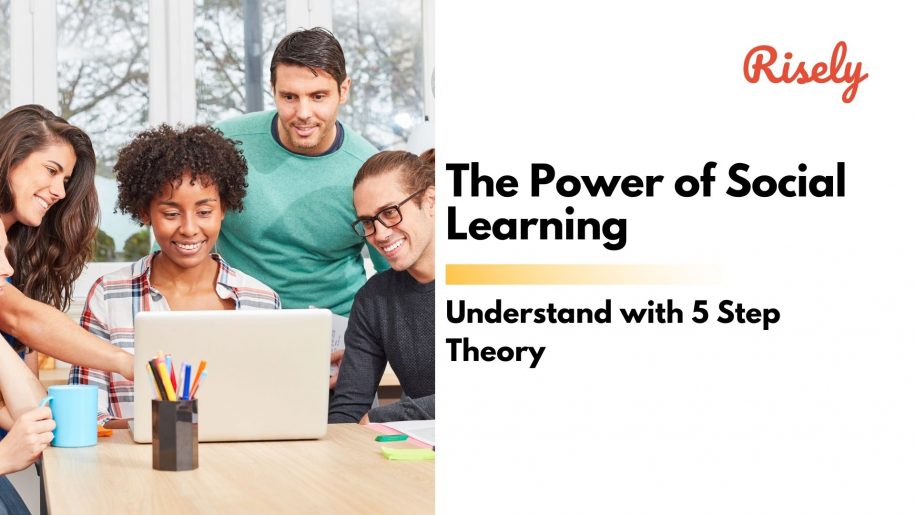The Power of Social Learning: Understand with 5 Step Theory
Are you tired of attending traditional, mundane training sessions at work? Do you find yourself craving a more interactive and engaging learning experience? Well, you’re not alone! Social learning at work has emerged as a game-changer in today’s fast-paced and ever-evolving professional landscape. But what exactly is it, and how can it benefit you and your organization? Buckle up and get ready to dive into a world where knowledge is shared, skills are honed, and collaboration thrives. In this blog, we’ll explore social learning and how it benefits the workplace. Understand the social learning theory, unravel its secrets, and discover how it can revolutionize how we learn and grow as professionals. Let’s explore!What is Social Learning?
Social learning in the workplace refers to acquiring knowledge, skills, and behaviors through interactions and collaboration with others in a social context. Unlike traditional forms of learning that rely solely on formal training or individual study, social-learning emphasizes the importance of social interaction, observation, and participation in a community of learners. Employees can learn from their peers, mentors, managers, and customers or clients in a social learning environment. This learning can occur through various channels, such as informal conversations, team discussions, on-the-job shadowing, group projects, and collaborative problem-solving. One of the fundamental principles of social-learning is the idea that knowledge is co-created and shared within a community. Individuals actively engage with one another, exchanging ideas, perspectives, and experiences, which leads to acquiring new knowledge and skills. It encourages a culture of continuous learning and encourages individuals to take responsibility for their learning by actively seeking opportunities to learn from others.Other Interesting Reads
Social Learning Theory
Social learning theory, developed by psychologist Albert Bandura, is a theory that explains how people learn new behaviors and acquire new skills through observing and imitating others. According to social learning theory, learning is not solely based on direct reinforcement or punishment but also occurs through observational learning, where individuals learn by observing the behaviors of others and the consequences of those behaviors. Key concepts of social learning theory include: Observational Learning Employees often learn by observing their colleagues, supervisors, or other professionals in the workplace. They observe how others handle tasks, solve problems, communicate, and interact with clients or customers. By observing successful behaviors and outcomes, individuals can learn new strategies and approaches to improve their performance. Modeling In the workplace, individuals often look up to experienced coworkers or leaders as models to emulate. As a result, they observe their behaviors, work ethics, and interpersonal skills and may adopt them in their work. For example, a new employee may observe a seasoned colleague’s effective time management techniques and use them to increase productivity. Reinforcement Reinforcement plays a significant role in shaping behaviors at work. When employees witness their coworkers receiving positive feedback, recognition, or rewards for their achievements, they are likelier to imitate those behaviors. Conversely, if they observe negative consequences or reprimands for certain actions, they will be less likely to repeat them. Vicarious Reinforcement Employees can also learn from the experiences of others in the workplace. For example, suppose they observe their colleagues receiving promotions, salary increases, or other desirable outcomes due to specific skills or behaviors. In that case, they may be motivated to develop those skills or adopt similar behaviors to enhance their career prospects. Self-efficacy Self-efficacy beliefs are crucial to employees’ work performance and career development. When individuals witness their coworkers completing challenging tasks, overcoming obstacles, or achieving professional growth, it can increase their confidence in their abilities. This belief in their capabilities can motivate them to take on new challenges, set higher goals, and persist in facing difficulties. Understanding social learning theory can help organizations foster a positive learning environment, encourage employee knowledge-sharing, and provide mentoring and role-modeling opportunities. It can also guide the design of training programs and interventions that leverage observational learning to enhance skill acquisition and professional development.
Benefits of Social Learning in the Workplace
Social-learning in the workplace offers several benefits that can contribute to individual and organizational success. Here are some key benefits of social learning:- Knowledge Sharing: It encourages sharing of knowledge and expertise among employees. By observing and interacting with colleagues, individuals can learn from the experiences, insights, and best practices of others. This knowledge exchange enhances overall learning within the organization and helps employees better understand their roles and responsibilities.
- Skill Development: Employees can acquire new skills and competencies through social learning. By observing skilled colleagues or mentors, individuals can learn practical techniques, problem-solving approaches, and effective strategies. This can lead to improved job performance, increased efficiency, and the ability to tackle new challenges.
- Collaboration and Teamwork: Social-learning fosters collaboration and teamwork in the workplace. By observing and interacting with others, employees can develop better communication skills, learn how to work effectively in teams and understand the dynamics of successful collaboration. This promotes a positive work culture, encourages knowledge sharing, and improves productivity.
- Employee Engagement: It encourages active participation and engagement among employees. When individuals can learn from and interact with others, they feel more involved and connected to their work and the organization. This sense of engagement can lead to higher job satisfaction, increased motivation, and improved retention rates.
- Continuous Learning Culture: Social-learning promotes a culture of continuous learning within the organization. When employees observe their colleagues engaging in ongoing learning and professional development, it sets a positive example and reinforces the importance of lifelong learning. This encourages individuals to seek new knowledge, embrace learning opportunities, and stay updated with industry trends and developments.
- Mentoring and Coaching: It allows mentoring and coaching relationships to flourish. Experienced employees can serve as mentors, guiding and supporting less-experienced colleagues in their professional growth. Mentors can help mentees develop skills, gain confidence, and navigate their career paths more effectively through observation, feedback, and modeling.
- Adaptability and Innovation: Social-learning promotes adaptability and fosters a culture of innovation. Employees can stay abreast of emerging trends, industry changes, and innovative practices by observing and learning from others. This enables them to adapt to new situations, think creatively, and contribute to organizational growth and innovation.
Conclusion
Social learning at work has immense potential to transform how we learn and develop professionally. By harnessing the power of observation, collaboration, and knowledge sharing, employees can acquire new skills, enhance their performance, and foster a culture of continuous learning. In addition, through social-learning, organizations can create engaging learning environments that promote employee engagement, collaboration, and innovation. So, why wait? Embrace the power of social-learning and unlock your true potential in the workplace. And for a seamless and personalized learning experience, check out Risely, an AI-powered manager learning coaching platform that can take your professional growth to new heights. Start your journey toward success today!Can your communication skills help you become an enabler to social learning?
Find out now with the free communication skills assessment for managers and leaders in just a few minutes.
Other Related Blogs
How to Create a Course with AI: A Guide for L&D Professionals
How to Create a Course with AI: A Guide for L&D Professionals According to a McKinsey survey(1), only 11% of business leaders believe their leadership development initiatives yield meaningful results.…
How to build a Learning and Development Action Plan ft Katie Greenwood
Does your company’s Learning and Development (L&D) strategy feel like more “guessing” than “winning”? You’re not the only one! In today’s fast-changing world, taking a random approach to L&D is…
Generative AI for Learning and Development: Getting Started
Generative AI for Learning and Development: Getting Started In 2024, organizations spent $401 billion globally on corporate training(1), yet 70% of employees report feeling unprepared for the future of work…
Future proofing a learning strategy for organizations with Inna Horvath
Future Proofing a Learning Strategy for Organizations with Inna Horvath With the advent of AI, everyone’s anticipating changes. L&D leaders in charge of building a learning strategy for organizations are…


